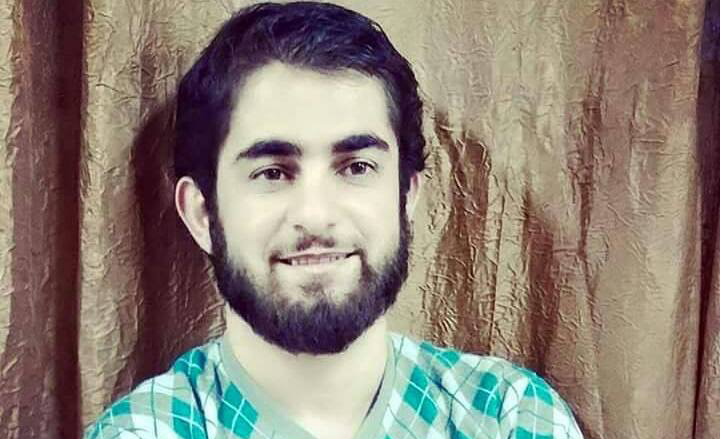Iran Executes Kurdish Prisoner despite Claim of Forced Confession

As Many As 20 Others May Have Been Executed Too
Kurdish prisoner Shahram Ahmadi was hanged in the courtyard of Iran’s Rajaee Shahr Prison today, August 2, 2016, at 4:53 p.m., according to a member of his family. The execution took place despite the fact that the prisoner stated the entire case against him was based on a forced false confession.
Prison officials did not allow Shahram Ahmadi’s family to see him before his execution, and informed the family of his death on their way from Kurdistan to Tehran.
“They called us this morning to go visit him in Tehran for the last time. We got on the road, but they called us on our way and told us not to go to prison, and to go to the morgue in Kahrizak instead. We realized he must have been executed. They called again to say that we should go directly to Behesht-e Zahra Cemetery. They had executed him before we arrived. We were only able to get the body,” said the member of Shahram Ahmadi’s family.
The family member told the International Campaign for Human Rights in Iran that the family arrived at the cemetery at 5:00 pm to receive the body and take it for burial.
The Campaign has also learned that in addition to Shahram Ahmadi, 20 other Sunni prisoners were hanged inside Rajaee Shahr Prison this morning. The names of nine of these prisoners known so far to the Campaign are: Bahman Rahimi, Mokhtar Rahimi, Yavar Rahimi, Arash Sharifi, Kaveh Veisi, Ahmad Nasiri, Kaveh Sharifi, Behrouz Shahnazari, and Talek Maleki.
According to another source, all 20 inmates were hanged without a chance to have a last visit with their families, and the bodies of all the executed inmates were delivered to their families at Behesht-e Zahra Cemetery.
Regarding the case of Shahram Ahmadi, Iran’s Supreme Court had rejected the appeal against his death sentence for activism as a Sunni Muslim and Kurd, despite assertions that his confession was made under torture.
Ahmadi was sentenced to death for “moharebeh (enmity with God) through effective membership in the Towhid and Jihad terrorist group, supporting this terrorist group and its criminal and terrorist activities, keeping four Kalashnikov rifles and their related ammunition, and carrying three Kalashnikov rifles and participation in an armed attack on a police special unit with the aim of confronting the Islamic Republic.”
Ahmadi’s lawyer stated in his defense that Shahram Ahmadi had never accepted membership and support of Towhid and Jihad group, had never been its member, and had never taken up arms.
“The sentence against him is unfair and not in line with the charges against him that are based on false confessions he made while being tortured,” an informed source told the Campaign in July.
“Shahram wants the Judiciary to hold a fair trial and reconsider his sentence. He did not have a weapon at the time of his arrest and did not confront the agents, so why should he be condemned to death for [the charge of] ‘waging war against God?’” the source said.
Members of ethnic or religious minorities in Iran who engage in criticism of the government are singled out by the authorities for particularly harsh treatment, and there is a well-documented history of the Judiciary disproportionately meting out capital punishment to minority activists.
Additionally, the Islamic Republic has a long and documented history of forcing detainees to make false confessions.
Ahmadi was arrested in Sanandaj, the capital of Iran’s Kurdistan Province, on April 26, 2009 by Iran’s Revolutionary Guards. Even though he was unarmed, he was shot several times and lost one of his kidneys as a result.
He was held in solitary confinement for 34 months in detention centers controlled by the Intelligence Ministry in the cities of Sanandaj and Zanjan before being transferred to Evin Prison in Tehran and finally Rajaee Shahr Prison in Karaj.
Ahmadi’s co-defendants, his younger brother Bahram and his friend Asghar Rahimi, were executed in December 2012 in Rajaee Shahr Prison.
In August 2015, Branch 31 of the Supreme Court had asked Branch 28 of the Revolutionary Court to review the death sentence against Ahmadi but it was reinstated by Judge Mohammad Moghisseh for Ahmadi’s alleged membership in a Sunni Salafist opposition group. Branch 41 of Iran’s Supreme Court upheld the sentence on June 26, 2016.
In November 2015, a source told the Campaign that when Ahmadi was young he attended Sunni religious classes with friends from his neighborhood in Kurdish mosques and distributed books and audio material on Sunni Islam.
“He and a number of his friends were leaving a mosque in Sanandaj on their way home after evening prayers when agents ordered them to halt. When Shahram refused and continued to walk away, they fired shots at him,” said the source.
“Making speeches, distributing books and pamphlets, or opposing the government are not capital offenses,” added the source. “Unfortunately, Judge Moghisseh said that Shahram’s first two crimes are that he’s a Sunni and a Kurd. Therefore, he was presumed guilty from the start.”






